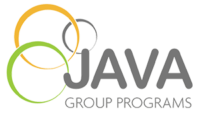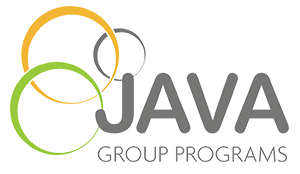Java Music Club
What is the Java Music Club?
The Java Music Club program is a research-based peer support activity group program designed for older adults.
The program has been implemented in over 2000 organizations across Canada and the US, including long-term care (nursing homes, skilled nursing), assisted living, retirement and independent living as well as adult day centers, hospitals, affordable housing and senior services within the community.
This program is intuitive and easy to facilitate by recreation staff, residents, volunteers or family members. The focus is on peer support – residents helping residents – which adds purpose and meaning to their lives.
Program materials include step-by-step instructions, a group manual, a facilitator’s guide, a hand-carved talking stick, an implementation training DVD, and 8 CD’s of custom recorded music in lower singable keys.
The group manual includes 52 themes chosen by the research participants, 52 large-size photographs indexed to match the themes, quotes and readings and indexed music. The program is added to a regular recreation program calendar and scheduled weekly, twice a week or daily in each neighbourhood/area of the organization.

Why is this program unique?
The program is unique because the focus is on peer support. It is based on the altruistic concept that people are happiest when they are helping one another.
Everything we have learned about help in residential care tells us to think of it as a one-way street: what we can do to and for residents. This kind of help continues to maintain static roles of residents as passive recipients of care.
Mutual help in peer support implies both people taking on both roles with each other. It means sharing vulnerabilities and strengths and finding value in receiving help from one another.
All the components of the program are geared to make this happen. It is different from typical recreation programs in that it is not about what the staff can do for the group participants, but what the participants can do for one another.
Research has shown that having such a variety of components in one program (themes, photography, music, readings and the talking stick), makes for a highly participatory group.
Once the Java Music Club program is established (ideally throughout the organization), the next steps include implementing the Java Memory Care program for those living with advanced dementia and then the Java Mentorship Program to reach out to those who are lonely or socially isolated.

The program is unique because the focus is on peer support. It is based on the altruistic concept that people are happiest when they are helping one another.
Everything we have learned about help in residential care tells us to think of it as a one-way street: what we can do to and for residents. This kind of help continues to maintain static roles of residents as passive recipients of care.
Mutual help in peer support implies both people taking on both roles with each other. It means sharing vulnerabilities and strengths and finding value in receiving help from one another.
All the components of the program are geared to make this happen. It is different from typical recreation programs in that it is not about what the staff can do for the group participants, but what the participants can do for one another.
Research has shown that having such a variety of components in one program (themes, photography, music, readings and the talking stick), makes for a highly participatory group.
Once the Java Music Club program is established (ideally throughout the organization), the next steps include implementing the Java Memory Care program for those living with advanced dementia and then the Java Mentorship Program to reach out to those who are lonely or socially isolated.

Need more information?
For details and to order these programs email info@JavaGP.com or call toll free: 1-866-523-2411
